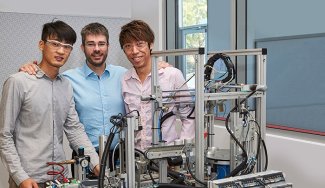

Why choose this course?
Gain a competitive edge and develop technical skills for your future in engineering with this qualification.
During your studies you will learn how to apply engineering principles, systems and processes. You will also develop skills in drafting and design, gain analytical knowledge involving manufacturing and fabrication techniques, and learn to draw and design mechanical equipment.
On completion of this course, you may find employment in a range of industries in roles involving: computer aided design and drafting, process plant drafting and design, machine drafting and design, air conditioning drafting and design, shipbuilding drafting and design, plant maintenance supervision (building on a trade background), and general engineering and technical functions.
Career opportunities
- Associate Engineer
- Detailed Drafter
- Maintenance Technician
-
An IELTS score (academic) of 6.0 with no band score less than 5.0 or equivalent.
-
Completion of MEM50222 Diploma of Engineering - Technical is required for entry into this course.
There may be further semester intakes available for enrolment. You can view any further intakes when you submit your online application(opens in a new tab).
For information about pathways from TAFE to university, view our Pathways to university page.
How to apply
Apply to study at TAFE in six steps:
- find a course;
- check entry requirements;
- submit an application;
- accept your offer and pay;
- apply for your student visa; and
- receive your visa and come to Australia for your studies.
Build your own course guide
Select the study areas, courses and topics you like. Get your custom guide by email!
Download study area guide(opens in a new tab)
Contact us(opens in a new tab)
TAFE International Western Australia (TIWA) is the Registered Training Organisation (RTO) and Commonwealth Register of Institutions and Courses for Overseas Students (CRICOS) provider, for the delivery of training to international students, enrolled in a TAFE course in Western Australia. This nationally recognised course is delivered by a Western Australian TAFE college on TIWA's behalf. TIWA retains responsibility for the quality of the training and assessment delivered by the TAFE colleges and for the issue of certification documentation to students.

